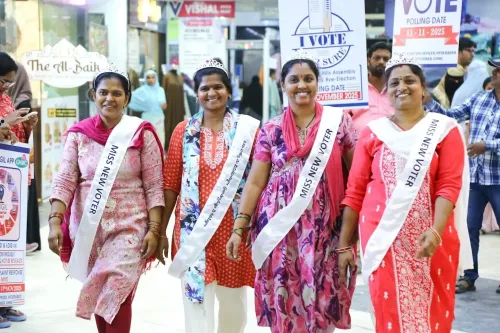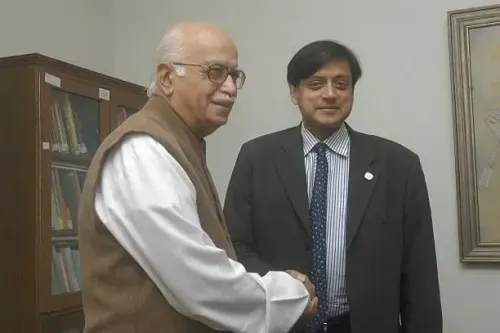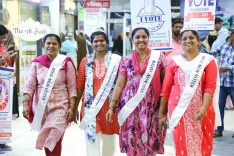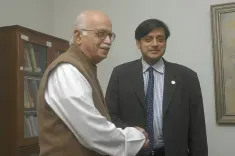Questionable and Biased: Rahul Gandhi and Kharge Critique NHRC Chair Selection
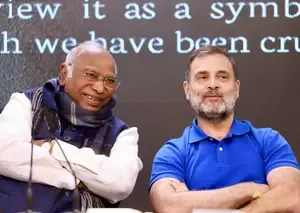
New Delhi, Dec 24 (NationPress) The Congress party expressed its dissent on Tuesday, a day after President Droupadi Murmu named former Supreme Court justice Justice V. Ramasubramanian as the chairperson of the National Human Rights Commission (NHRC). The Congress leadership argued that the selection process was inherently flawed, predetermined, and raised serious questions about the impartiality and fairness of the decision-making process.
Rahul Gandhi, the Leader of Opposition in the Lok Sabha, along with Mallikarjun Kharge, the Leader of Opposition in the Rajya Sabha, recorded their dissent “without prejudice to the names of the Chairperson and members approved by the Selection Committee”.
The dissent note, dated December 18, outlines four significant concerns.
Firstly, it states, "The selection process employed by the Committee was fundamentally flawed. It constituted a predetermined exercise that disregarded the established tradition of mutual consultation and consensus, which are vital for such matters. This departure undermines the principles of fairness and impartiality, essential for the credibility of the Selection Committee. Rather than encouraging deliberation and ensuring a collective decision, the Committee relied on its numerical majority to finalize the names, ignoring legitimate concerns and perspectives raised during the meeting."
The second point emphasizes: "The NHRC is a crucial statutory body responsible for protecting the fundamental human rights of all citizens, especially those from marginalized and oppressed communities. Its effectiveness in fulfilling this mandate is significantly influenced by the inclusiveness and representativeness of its composition. A diverse leadership is paramount to ensure that the NHRC remains attuned to the unique challenges faced by various communities, particularly those most vulnerable to human rights violations."
The note mentions that the two Congress leaders had suggested the names of Justice Rohinton Fali Nariman and Justice Kuttiyil Mathew Joseph for the chairperson role, considering both merit and the necessity for inclusivity.
"Justice Rohinton Fali Nariman, a distinguished jurist from the minority Parsi community, is celebrated for his intellectual profundity and steadfast commitment to constitutional values. His inclusion would convey a strong message about the NHRC's dedication to representing India's pluralistic society. Likewise, Justice Kuttiyil Mathew Joseph, a former Supreme Court judge from the minority Christian community, has consistently delivered rulings that emphasize individual freedoms and the protection of marginalized groups, making him an exemplary candidate for this pivotal position."
Furthermore, the note indicates that Kharge and Gandhi recommended Justice S. Muralidhar and Justice Akil Abdulhamid Qureshi for the member positions.
According to the note, both candidates have outstanding reputations for upholding human rights. Justice S. Muralidhar is widely acknowledged for his landmark rulings promoting social justice, including his efforts against custodial violence and the safeguarding of civil liberties. Justice Akil Abdulhamid Qureshi, a member of the Muslim minority community, has consistently advocated for constitutional principles and shown a robust commitment to accountability in governance. Their inclusion would enhance the NHRC's effectiveness and commitment to diversity.
The third concern highlights, "While merit is undoubtedly the foremost criterion, maintaining a balance that reflects the regional, caste, community, and religious diversity of the nation is equally important. This balance ensures that the NHRC functions with an inclusive perspective, sensitive to the lived experiences of all societal segments. By overlooking this crucial principle, the Committee risks eroding public trust in this esteemed institution."
The final concern states, "Lastly, the dismissive attitude adopted by the majority of the Selection Committee in today’s meeting towards these considerations is profoundly regrettable. The NHRC's credibility and effectiveness hinge on its capacity to embody the diversity and inclusiveness that characterize India’s constitutional ethos."
The two leaders asserted that the names they proposed embody this spirit and align with the foundational principles of the Commission.
"Their exclusion raises significant concerns about the impartiality and fairness of the selection process," Kharge and Gandhi expressed in their dissent note.

